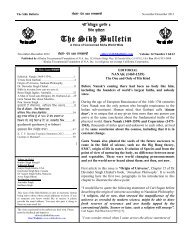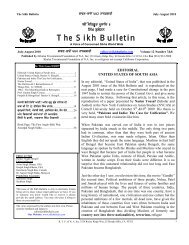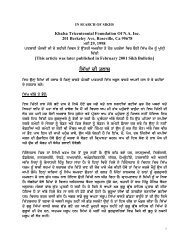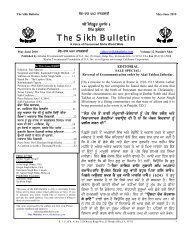Create successful ePaper yourself
Turn your PDF publications into a flip-book with our unique Google optimized e-Paper software.
<strong>The</strong> <strong>Sikh</strong> <strong>Bulletin</strong> cyq-vYswK 539 March-April 2007<br />
spokesman for 33 years till he died in June 1973 at 67.<br />
Amongst others in paying homage to him will be leaders of<br />
the Vishwa Hindu Parishad, Bajrang Dal and the BJP.<br />
Not many of the tribute-payers will bother to read what<br />
Guruji had to say about India’s past and future but will<br />
nevertheless vie with each other in praising him. No one can<br />
deny that the BJP and other right-wing Hindu parties<br />
acquired the status they enjoy today because of Guru<br />
Golwalkar. We owe it to ourselves to know more about him.<br />
Madhav Sadashiv Golwalkar was born in 1906 at Ramtek<br />
near Nagpur in a Brahmin family. Brahmin is important<br />
because Brahminism forms as important aspect of his views,<br />
leadership of the RSS as well as other fundamentalist Hindu<br />
parties.<br />
All have been Brahminically top-heavy. He was educated at<br />
Banaras Hindu University where he came under the influence<br />
of its founder Pandit Madan Mohan Malaviya (Brahmin) who<br />
was nominally a member of the Congress Party but<br />
effectively a right-wing Hindu. For a while, Golwalkar toyed<br />
with the idea of becoming a sanyasi-scholar but was<br />
persuaded to take active part in tackling societal problems.<br />
He joined the RSS in 1940 and was later nominated by<br />
Hedgewar as his successor and second sarsangchalak.<br />
Golwalkar’s thinking was much influenced by Veer Savarkar<br />
(also a Brahmin). Both supported the caste system, asserting<br />
the superiority of the Brahmins over other castes and the<br />
need to keep their lineage free of contamination by intermarriages<br />
with other castes. Both regarded Islam and<br />
Christianity as non-Indian because they originated outside<br />
India and believed that unless they recognised India as their<br />
fatherland and holy land, they were to be treated as secondclass<br />
citizens.<br />
Both believed in the superiority of the Aryan race and<br />
approved of Adolf Hitler extermainating millions of Jews in<br />
gas chambers. Nevertheles they supported Zionism and<br />
Jewish State of Israel for no other reason than it was forever<br />
waging wars against its Arab neighbours who were Muslims.<br />
Islamophobia became an integral part of Hindutva. L.K.<br />
Advani calls it a "noble concept". He named the Port Blair<br />
airport after Savarkar. <strong>The</strong>y have a life-size portrait of him in<br />
Parliament. Najma Heptullah paid a floral tribute to him;<br />
Mukhtar Abbas Naqvi Shah and Nawaz Hussain are active<br />
members of the BJP. We are never short of opportunists.<br />
Returning to Golwalkar, I had read his Bunch of Letters<br />
earlier and put it out of my mind. I didn’t know of his We Or<br />
Our Nationhood Defined. It was published in 1939 and<br />
carried by the RSS journal Organiser.It has been republished<br />
with the full text and A Critique by Shamsul Islam by Pharos<br />
Press. It substantiates all of what I have said. Golwalkar’s<br />
concept of a nation is as fellow: ".. thus applying the modern<br />
understanding of ‘Nation’ to our present conditions, the<br />
conclusion is unquestionably forced upon us that in this<br />
country, Hindusthan, the Hindi Race with its Hindu<br />
Religion, Hindu Culture and Hindu language (the natural<br />
family of Sanskrit and her offsprings) complete the Nation<br />
concept..."<br />
Sanskrit was never the spoken language of the people who<br />
used their regional languages, some of them like Tamil and<br />
Malayalam claim to be older than it. Sanskrit remained<br />
largely a monopoly of the Brahmins. <strong>The</strong>re are other<br />
assertions of the Indian Aryans glorious past which are more<br />
fanciful than historically factual. To me they appear to be<br />
fabrications. You make your own judgment.<br />
From Tribune, Saturday, February 24, 2007<br />
*****<br />
CONCEPT OF SIKH LANGAR<br />
Lunch at the Langar: Exploring a Free Kitchen in Delhi<br />
Sarah Rich, sarah@worldchanging.com, February 28, 2007<br />
From: www.worldchanging.com<br />
Free-for-all is a term generally used to describe chaos. And<br />
chaos is a word one could use to describe much of Delhi.<br />
But at the Gurdwara Bangla Sahib kitchen, a <strong>Sikh</strong> temple<br />
which serves meals to around 10,000 people every single<br />
day, there's not a trace of chaos. And the food is free. For<br />
all.<br />
This week, Alex and I are at the Doors of Perception<br />
conference in India, where the theme is "Food and Juice."<br />
It's an exploration of food systems worldwide, and the<br />
energy required to make them go. On the first full day of the<br />
conference, the fifty-odd attendees split into small groups to<br />
go exploring the city of Delhi through its food culture. A<br />
number of groups focused on the prolific street vendor<br />
network, several looked at Delhi's water, and my group of<br />
nine went to Gurdwara Bangla Sahib to see how they<br />
achieve the daunting task of feeding thousands of people in<br />
single a day. As Debra Solomon told us when introducing<br />
the excursion the previous evening: "<strong>The</strong>y do the most<br />
exquisite dishwashing ritual you'll ever see." But actually,<br />
the <strong>Sikh</strong> guide who escorted us through the temple grounds<br />
told us in no uncertain terms that the kitchen activities are<br />
absolutely without ritual. "Cooking food is cooking food,"<br />
he said, "No ritual. Just cooking." But if it can't be called a<br />
ritual, it can surely be called a dance -- a rhythmic,<br />
continuous choreography with mounds of dough, cauldrons<br />
of lentils, dozens of hands, and an endless stream of hungry<br />
visitors.<br />
Every <strong>Sikh</strong> temple throughout the world has a Langar<br />
(Punjabi for "free kitchen"). This is not a soup kitchen. It's<br />
not exclusively for the poor, nor exclusively for the <strong>Sikh</strong><br />
community. Volunteering in the cooking, serving and<br />
cleaning process is a form of active spiritual practice for<br />
devotees, but the service they provide asks no religious<br />
K. T. F. of N. A. Inc. 3524 Rocky Ridge Way, El Dorado Hills, CA. 95762 9
















